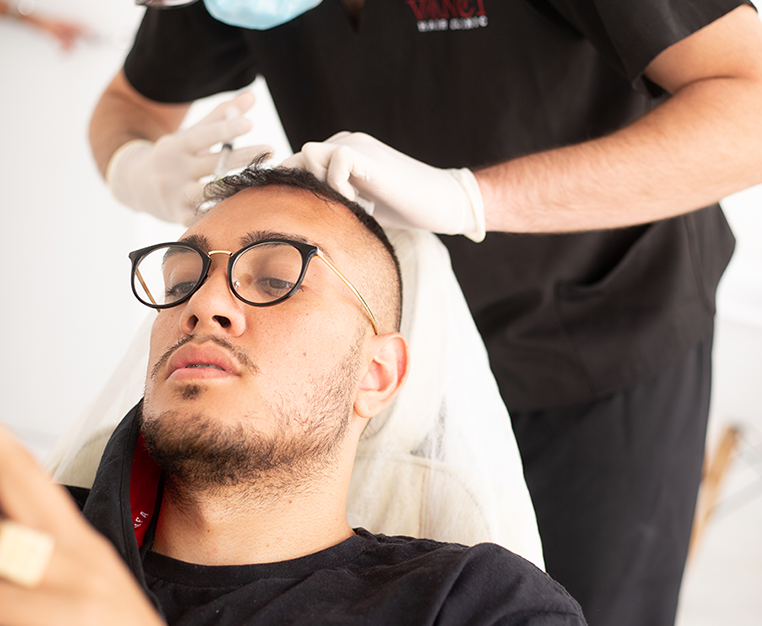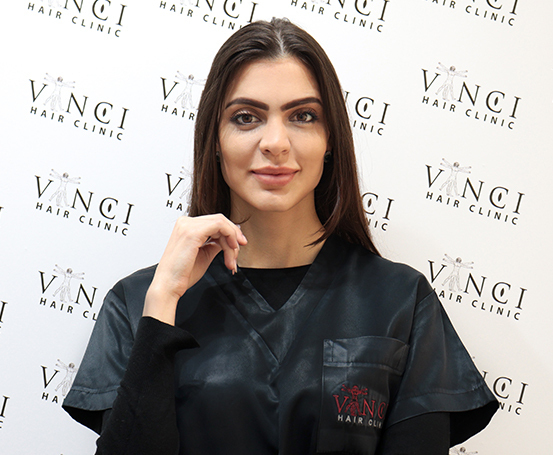Hair loss is more common than people would like to admit and affects half of the population of men and women. Hair loss is also known as alopecia (medical term), the thinning or absence of hair on the head or the body. Alopecia or hair loss can affect just the scalp, parts of the body, or the entire body and can be temporary or permanent.
Androgenetic alopecia is the most prevalent type of alopecia (male or female pattern hair loss), which is a type of hair loss that gradually occurs and requires a combination of hormones and genetics to develop. Male pattern or female pattern hair loss characteristically refers to the receding hairline in men and thinning at the crown of women. Research shows that more than 50% of women will experience androgenetic alopecia by the age of 50- 80, while some may start to develop this hair loss condition at their teenage ages. This form of hair loss is often associated with family history, genetics, or hereditary. However, some people may have androgenetic alopecia without any family history.
Alopecia Areata is also a commonly known type of hair loss or alopecia. It is a non-scarring and reversible form of alopecia that produces one or more patches of baldness and is caused by a disorder in the immune system that damages the hair follicles. However, most times, these bald areas may regrow hair simultaneously.
Apart from hereditary, genetics or family history, alopecia can be a result of ageing, medical conditions, poor nutrition, stress, or hormonal changes.
Hair Loss Treatments To Avoid
Above 50% of the population of men and women in their 50s – 80s suffer from significant male or female pattern hair loss. The pressure on many individuals to look younger or get back their confidence has since been on the high side. Most individuals are impatient and want an instant solution to their hair loss condition. This reason has driven an increase in the sale of products promoted to be natural, drug-free, chemical-free solutions for hair loss. These formulations only indulge the population’s desire to find a way to stop hair loss but lack the evidence to prove their effectiveness.
Many patients with hair loss will start dietary supplements without consulting a medical doctor in the hope that the loss of hair will be stopped. Dermatologists have warned to steer clear of these supplements and vitamins and those containing a large amount of biotin as they are not regulated before marketed and have no proven evidence to back their claims.
While these products do contain varieties of nutrients or supplements, in situations when there’s no deficiency, over-supplementation occurs. Over supplementation of nutrients like vitamin A, E, biotin has been proven to be harmful to the hair and contributes to hair loss. Products like castor oil are also marketed as a remedy for hair loss. Again, none of these oils, supplements, or vitamins has been studied thoroughly for their effectiveness, and there’s no assurance that these products are safe for use.
Effective Hair Loss Treatments
The effectiveness of any hair loss treatment is strongly dependent on the cause of hair loss. Hair loss caused by stress or lack of sleep and poor nutrition is only temporary and will be resolved once the triggers are addressed. There are proven and effective methods that help with hair loss and hair regrowth.
Minoxidil
This is a medication used to treat male pattern baldness (androgenetic alopecia). Minoxidil solution is an over the counter treatment that comes in foam, liquid, or shampoo form. It was the first proven most effective treatment for hair loss and hair growth. Minoxidil is not to be used for hair loss without a known cause or reason. This medication needs to be used continuously for at least 4-6 months to see benefits. However, if irritation or discomfort occurs from using the product, discontinue use.
How to use Minoxidil In 3 Easy Steps
- To use foam, wash your hands and dry well.
- Clean and dry scalp area before applying the recommended amount of foam to the scalp.
- Allow foam to completely dry before styling your hair as you wish.
Use once daily for women and twice a day for men. Always read and follow directions on the package before using. It’s advisable to consult your doctor if you are unsure about any information or you develop side effects.
Finasteride (Propecia) For Men
Finasteride is sold under the brand name Propecia or Proscar and is a medication which shrinks an enlarged prostate and treats pattern hair loss in men. The medication blocks the production of male hormones in your body that halts hair growth. Surprisingly, finasteride also treats excessive hair growth in women. Finasteride comes in tablet form or pills which are taken orally.
Hair Transplant Surgery To Combat Hair Loss
Androgenetic alopecia does not involve the hair in the occipital area, the back of the head, and between the ears, which makes hair transplant or surgery a permanent treatment. The hair follicles in this region of the scalp are resistant to hair loss and remain a viable donor for transplant surgery.
Vinci Hair Clinic is a state of the art hair clinic offering hair loss treatments, transplant surgery and micro scalp pigmentation options for hair restoration. If you’re experiencing hair loss and you don’t understand why it is advisable to seek professional help. Book your free consultation today and we will help get to the bottom of your hair loss problem.




